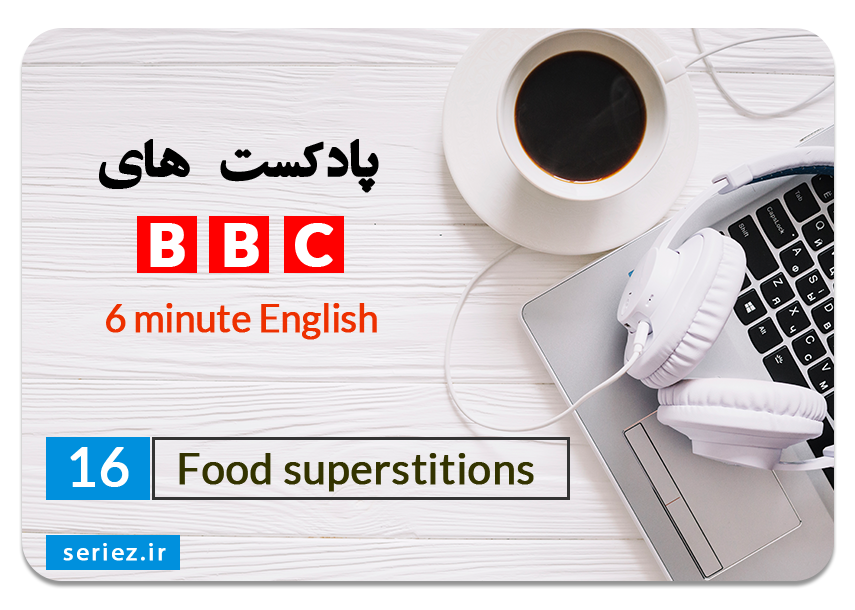پادکست های BBC 6 minute English – Food superstitions

قسمت شانزدهم پادکست های BBC 6 Minute English
در بخش پانزدهم پادکست های ۶ دقیقه ای بی بی سی، 6 لغت مهم با محوریت موضوع Food superstitions (خرافات مربوط به غذا) بررسی می شود.
- ابتدا پادکست را بدون متن گوش کنید.
- آن را دوباره به همراه متن گوش دهید و
- در مرحله آخر لغات آن را مرور کنید.
پادکست شماره 16 (Food superstitions)
superstitions خرافات
Ex: It’s just a superstition that black cats bring bad luck
فقط یک خرافاته که گربه سیاه بدبختی میاره
ward off دفع کردن، پیش گیری کردن
Ex: A daily intake of 20 mg of vitamin C is known to be sufficient in most cases to ward off scurvy
برای دور نگه داشتن/دفع کردن (مرض)/مبتلا نشدن به/جلوگیری از ابتلا به اسکوربیت مصرف روزانه ۲۰ میلیگرم ویتامین C کفایت میکنه
evil eye چشم شور
Ex: He has evil eye
blanket term نمونه مشابه، تنها یک مثال از آن
Ex: “American” can be seen as something of a blanket term, considering how drastically people differ from one part of the country to the next.
واژه امریکن تنها میتونه یک مثال از مواردی باشه که چطور افراد این کشور نقطه به نقطه متفاوت هستند.
chutney یکنوع چاشنی غذا، یک نوع ترشی با ادویه
Ex: The chutney should be a thick, pulpy consistency.
غذای چاتنی باید ضخیم و خشن باشد
teach (you) a lesson درس عبرت دادن، ادب کردن
Ex: They need to be taught a lesson!
باید ادب بشن
Rob
Hello. This is 6 Minute English from BBC Learning English. I’m Rob.
Sam
And I’m Sam, andI’m having a boiled egg for lunch today… I’ll just sprinkle some salt on top – there!
Rob
Oh, you’ve spilled some salt on the floor, Sam! Quick, throw some over your left shoulder.
Sam
Throw salt over my shoulder?! What are you talking about, Rob?
Rob
It’s bad luck to spill salt!
Sam
Oh dear! It looks like Rob believes in superstitions – old beliefs which are based on magic and mystery rather than science. Many superstitions are connected to food, as we’ll discover in this programme.
Rob
Right – like throwing salt over your shoulder to stop bad luck.
Sam
Oh come on, Rob! You don’t really believe that, do you?
Rob
Well, lots of people do believe food superstitions, including otherwise rational, scientific people. For example, have you ever blown out the candles on a birthday cake and made a wish? Or thrown rice over the bride and groom at a wedding?
Sam
Yes to both of those. Maybe I’m more superstitious than I thought!
Rob
Well, before we find out, it’s time for a quiz question about another famous food festival – Halloween.
Sam
That’s when people carve scary faces into pumpkins to frighten away evil spirits.
Rob
Yes. Right. The tradition of carving pumpkins, or Jack o’ Lanterns as they’re called in the United States, started out as a Celtic festival in Ireland – but it was the Americans who started using pumpkins. So what vegetable did the Irish originally use to scare away ghosts? Was it:
a) turnips?
b) potatoes?, or
c) squash?
Sam
I’ll say b) potatoes.
Rob
OK, Sam, we’ll find out the right answer later on. What’s for sure is that cultures from around the world have been connecting food and magic for thousands of years, and over time it’s created some strange beliefs.
Sam
Here’s food historian Tasha Marks describing one unusual superstition to BBC World Service programme, The Food Chain:
Tasha Marks
When you have superstitions and they sort of mix with science and health and medicine… and one of the examples of that would be something like garlic which… we all know garlic wards off vampires but it’s also been thought to ward off the ‘evil eye’, and if you come across the term, the ‘evil eye’, it’s a sort of blanket term that sort of applies to any bad luck.
Rob
Tasha says that garlic is believed to ward off vampires, meaning to repel or stop someone from harming you.
Sam
According to this superstition, garlic also keeps away the evil eye – bad luck or magical spells with the power to cause bad things to happen.
Rob
Tasha describes the ‘evil eye’ as a blanket term for any bad luck. Just as a real blanket covers the different parts of your body, a blanket term is aphrase that’s used to describe many examples of related things.
Sam
But food superstitions aren’t only about bad luck – they also give our lives meaning.
Rob
Jonty Rajagopalan owns a tourist agency in Hyderabad, India, where she introduces visitors to some of the city’s food traditions.
Sam
Here she is talking with BBC World Service’s, The Food Chain, about a tradition connected with the Hindu New Year. Can you spot the different tastes she mentions?
Jonty Rajagopalan
Some of the traditions give you a little bit of a lesson, like every new year, and not 1st January, not the Gregorian calendar New Year, but the Hindu calendar New Year, we would always be given… it’s a kind of a chutney which is made of all the five tastes: so you have sour, you have sweet, you have something bitter in it and your mum would always give it to you saying that this is what the rest of the year is going to be – you’ll have happiness, you’ll have challenges, you’ll have a little sadness, you’ll have bitterness in your life, which I think is a very nice tradition – it prepares you for everything in life.
Rob
At Hindu New Year, mothers give their children a special chutney – a mixture of fruit, spices, sugar and vinegar. Did you spot the chutney’s flavours, Sam?
Sam
There was sour, sweet and bitter.
Rob
Mothers tell their children that the coming year, like the chutney, will have its own flavours, both good and bad.
Sam
That’s why Jonty says that traditions can teach (you) a lesson – they show you what you should or shouldn’t do in the future, as a result of experience.
Rob
What a lovely way to end our look at food superstitions!
Sam
Yes, maybe we should make chutney at Halloween, instead of carving pumpkins – or whatever vegetable the Irish originally used.
Rob
Ah, yes – in my quiz question I asked you what vegetable was originally used instead of pumpkins to scare away ghosts.
Sam
I guessed it was b) potatoes.
Rob
Which was… the wrong answer! In fact, turnips were originally used, so maybe Irish ghosts are smaller than American ones!
Sam
OK, let’s recap the vocabulary we’ve learned about superstitions – old beliefs which are connected with magic.
Rob
Garlic is supposed to ward off, or keep away, dangers like the evil eye – bad luck or harmful magic.
Sam
The evil eye is an example of a blanket term – a phrase used to describe many examples of related things.
Rob
One Indian superstition involves chutney – a food mixing many flavours
Sam
These traditions can teach you a lesson – show you how to act in the future based on your past experience.
Rob
Right. Well, that’s all for this programme. Good luck with your language learning!
Sam
And if you’ve enjoyed this topical discussion and want to learn how to use the vocabulary found in headlines, why not try out our News Review podcast? Bye for now!
Rob
Bye bye!
حال می توانید به سوال های زیر پاسخ دهید:
- Are you superstitious?
- why do you think some people believe in superstitions?
جواب هاتون رو کامنت کنید…


دیدگاهتان را بنویسید